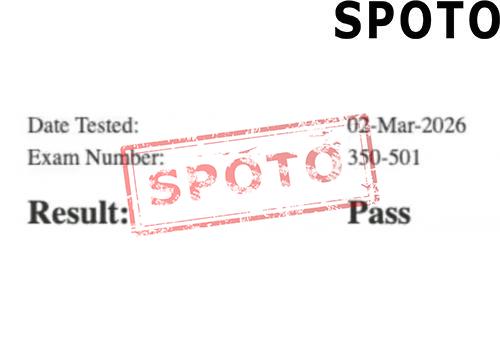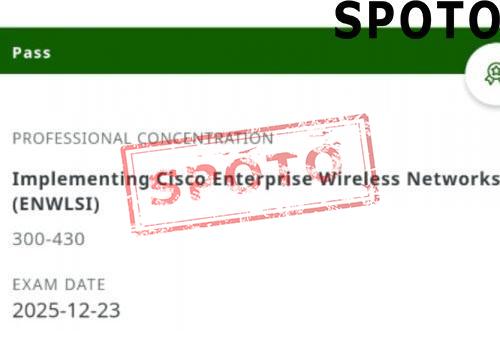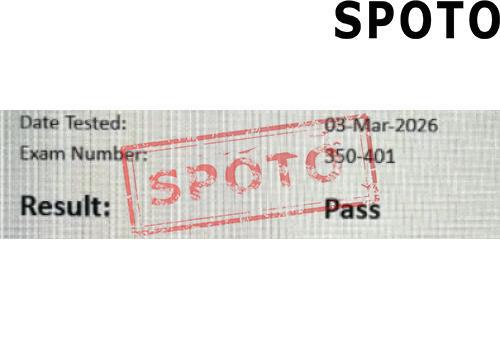
In the domain of network engineering, the CCNP (Cisco Certified Network Professional) certification is a significant indicator of professional expertise and proficiency. It not only demonstrates an individual's advanced competency in networking technology but also provides strong support for career advancement. The CCNP certification covers multiple professional disciplines, ranging from enterprise to security and data center, and is the key to enhancing the skills and competitiveness of network professionals.
The objective of this blog is to provide guidance for readers who are interested in pursuing the CCNP certification, yet may feel uncertain about which direction to choose. We will briefly introduce the significance of the CCNP certification and discuss how to select the most suitable certification path for you, with the aim of assisting readers in making informed decisions in the field of network engineering.
CCNP Certification Overview
With the continuous advancement of network technology and the evolving market demands, the CCNP (Cisco Certified Network Professional) certification has updated its professional tracks to better adapt to the current industry needs. The following is a detailed introduction to the latest CCNP certification paths, including learning content, exam requirements, career paths, and industry applications.
Enterprise
The CCNP Enterprise track specializes in designing, implementing, and maintaining state-of-the-art networking solutions for enterprise network environments. Candidates will learn about software-defined networking (SDN), automation, network security, WAN optimization, and more. Exam requirements typically cover subjects such as 350-401 ENCOR (Implementing Cisco Enterprise Networking Core Technologies).
Career Paths: Professionals in this field can become network architects, enterprise network engineers, network automation specialists, and more.
Industry Applications: CCNP Enterprise professionals can play a crucial role in a wide range of industries that require complex network solutions, such as financial services, healthcare, and large enterprises.
Security
The CCNP Security track aims to develop advanced skills for professionals in the field of cybersecurity, including security architecture design, threat prevention, VPN technology, endpoint security, and more. Exam requirements cover subjects such as 300-715 SECURE.
Career Paths: Professionals in the security track can become cybersecurity analysts, security engineers, information security managers, and more.
Industry Applications: With the increasing frequency of cyberattacks, cybersecurity experts are in high demand across various industries to protect critical information assets.
Data Center
The CCNP Data Center track focuses on the design, deployment, and management of data centers, including virtualization technologies, storage networking, cloud computing, and automated management. Exam requirements include subjects such as DCUCI and DCUFI.
Career Paths: Professionals in this track can become data center engineers, cloud computing architects, virtualization experts, and more.
Industry Applications: Data center skills are in high demand in industries such as IT, financial services, healthcare, and more, especially in cloud computing and big data.
Service Provider
The CCNP Service Provider track is designed for professionals working in the service provider industry, covering broadband and mobile network technologies, voice over IP, IP video services, and more. Exam requirements include subjects such as SPCORE and SPOPT.
Career Paths: Professionals in this field can become service provider network engineers, broadband network specialists, mobile network solution architects, and more.
Industry Applications: In industries such as telecommunications, internet service providers, and mobile network operators, service provider professionals play a key role.
Collaboration
The CCNP Collaboration track focuses on the design and implementation of unified communications solutions, including video conferencing, IP telephony, instant messaging, and collaboration applications. Exam requirements cover subjects such as COLLAB and COLLAB-WF.
Career Paths: Professionals in this track can become unified communications engineers, collaboration solution architects, and more.
Industry Applications: Collaboration technology is widely used in enterprise communications, distance education, telemedicine, and other fields.
How to Choose CCNP Certification Path?
The CCNP (Cisco Certified Network Professional) certification is an excellent way for networking professionals to showcase their advanced skills in complex networking environments. With multiple paths available, choosing the right CCNP path is critical for your career development. Here are some guidelines to help you make an informed decision:
Understand the Main CCNP Paths
Begin by familiarizing yourself with the key CCNP certification paths:
- CCNP Enterprise: Focuses on the design and implementation of enterprise networks, covering technical areas such as routing and switching, network security, data centers, cloud, and collaboration.
- CCNP Security: Concentrates on the implementation and management of network security, including firewalls, VPNs, intrusion prevention systems, and more.
- CCNP Data Center: Focuses on the design and implementation of data center networks, including network virtualization, storage networks, computing, and virtualization.
- CCNP Service Provider: Concentrates on the design and implementation of service provider networks, including LTE and EPC, IPTV, virtualization, and Fiber-to-the-Home.
- CCNP Collaboration: Focuses on the design and implementation of Unified Communications networks, including voice, video, and instant messaging solutions.
Evaluate Personal Career Goals
When choosing a CCNP track, first consider your career goals. If you aspire to work in an enterprise networking environment, the CCNP Enterprise path may be the best choice. If you are interested in network security, the CCNP Security track could be a better fit.
Consider Personal Interests and Passions
It's important to choose a field that truly interests you. Your interest and passion can drive you to learn more and succeed in the chosen area.
Assess Existing Skills and Experience
Evaluate your current skills and experience. If you have been working in a particular field for some time, it may be easier to pass the certification exam by selecting a CCNP track that aligns with your existing expertise.
Analyze Market Demand and Job Prospects
Research the market demand and job prospects for different CCNP directions. Certain tracks may become more popular due to technological developments and market trends. Choosing a direction with high market demand can improve your employment prospects.
Seek Advice and Feedback
Talk to professionals already working in your field of interest to get their advice and feedback. Their experience can help you better understand the realities of each CCNP direction.
Consider Certification Difficulty and Requirements
Different CCNP tracks have varying certification requirements and difficulty levels. Ensure that you have enough time and resources to prepare for the necessary exams and certifications.
Envision Future Career Development
Choose a direction that will support your long-term career development. Consider technology trends and industry directions, and select a CCNP path that has the potential for continued growth and advancement.
Conclusion
Each CCNP certification track is a critical springboard for the career advancement of networking professionals. Whether your passion lies in enterprise networks, cybersecurity, data centers, or collaboration, it is essential to choose a direction that aligns with your personal interests and market demands.
We encourage all professionals interested in network engineering to select a CCNP path based on their career plans and industry trends. Through systematic learning and dedicated practice, you can upgrade your skills, broaden your horizons, and achieve remarkable results.
By embarking on this journey, you will enhance your expertise, increase your earning potential, and drive your career to new heights of professional growth. As you navigate the CCNP tracks, stay attuned to industry needs, leverage your experience, and adapt to the changing landscape.
Let your CCNP certification be the catalyst that propels you towards excellence and recognition in the network engineering industry. Embark on this exciting path of professional development and unlock new opportunities for success.











